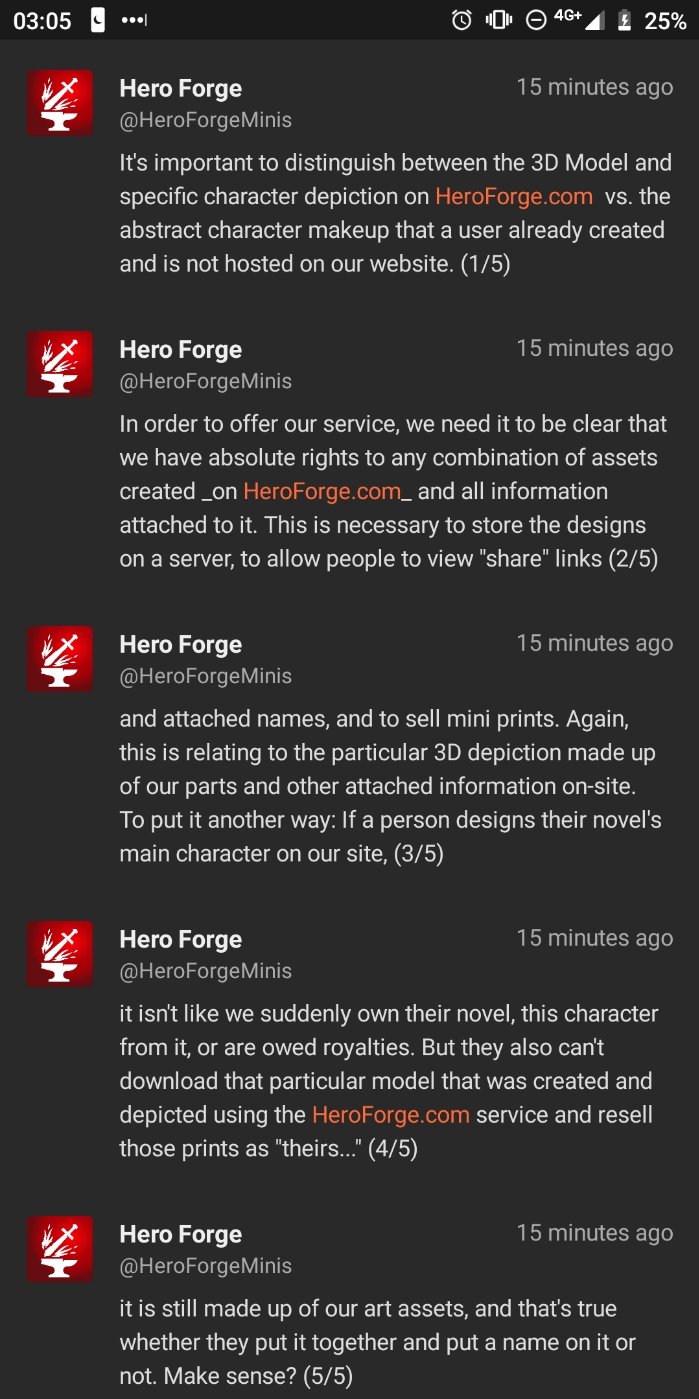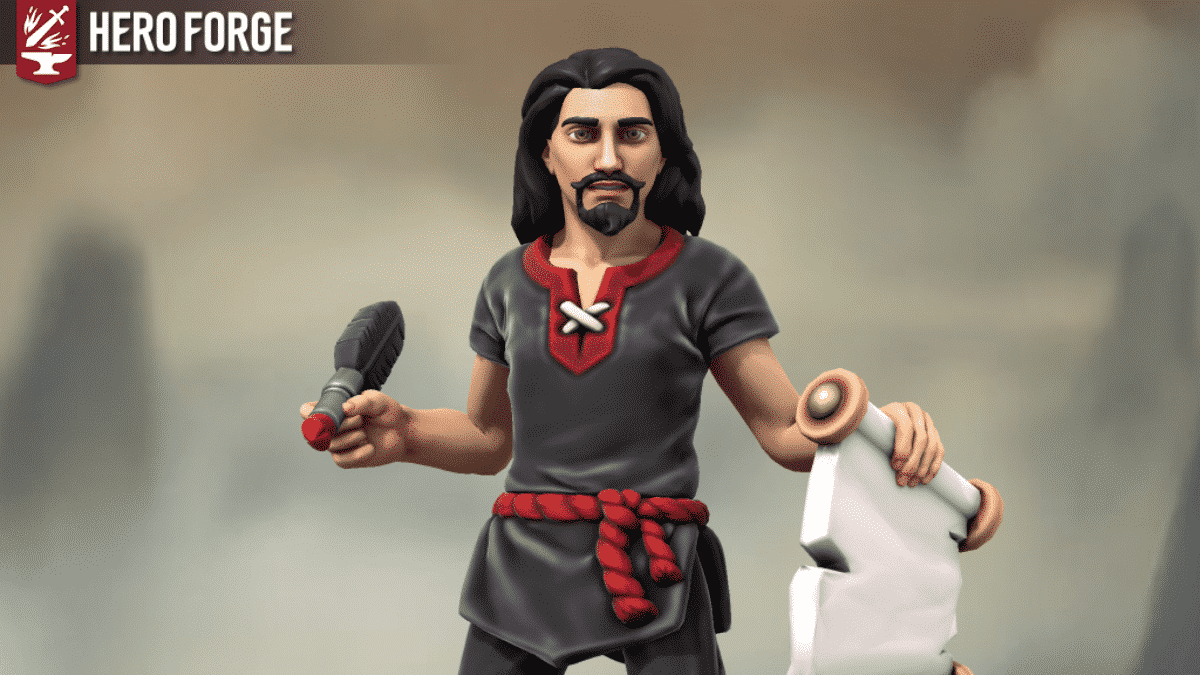Hero Forge and the Controversy Over Miniature Copyright

Miniatures have been growing in popularity over the past few years. These small figurines, used in a variety of both tabletop and role-playing games, have become both big business and a major creative outlet for their fans.
Miniature painting has been a hobby and a craft for quite some time and some have always taken to customizing and even creating their own figures. However, with the internet and the rise of 3D printing, the world of miniature creation has been opened up to a much more broad audience.
One site, Sky Castle Studios’ Hero Forge, allows users to design and perfect their own custom heroes (using pre-made assets provided by Hero Forge) and then either have Hero Forge send them a physical version of it or, if they prefer, they can download a digital version for printing on their own 3D printer.
However, with this new service came a new controversy: Copyright
The Hero Forge terms of service led many to believe that the site was laying claim to any and all creativity the user brought to the site. However, it’s something of a tempest in a teapot as Hero Forge’s terms of service really only impact a small subset of users and those would-be users likely came to the site with questionable intentions to start with.
The Terms of Service
The controversy is owed to one very lengthy and strangely-worded section of the terms of service. It reads as follow:
For the avoidance of doubt, you expressly agree that all intellectual property rights in and to any and all character or other designs or any 3D Models that you may create on or through the site (“Character Designs”) and all Content are the property of Sky Castle Studios and you hereby (A) irrevocably assign, transfer and convey, to the extent permitted by applicable law, all right, title and interest you may have in and to the Character Designs and the Content on a worldwide basis (including, without limitation, rights under patent, copyright, trademark, trade secret, unfair competition and related laws) to Sky Castle Studios or such other entity as Sky Castle Studios shall designate, to the extent ownership of any such rights does not automatically vest in Sky Castle Studios under applicable law, and (B) waive any moral rights therein to the fullest extent permitted under applicable law. You agree to execute any further documents and take any further actions requested by Sky Castle Studios to assist it in validating, effectuating, maintaining, protecting, enforcing, perfecting, recording, patenting or registering any of its right, title and interest in or to the Character Designs or the Content.
Hero Forge Terms of Service
It’s very easy to see why this turned so many heads. The text has users agree that Hero Forge owns “all intellectual property rights” in the designs and characters created on the site. It’s a very scary phrase as it implies a transfer of copyright.
This isn’t helped much by a later section that allows you to download materials from the site but only so far as you don’t use them for commercial purposes.
However, there probably isn’t as much here to worry about as some people think. While the language is certainly very aggressive, it’s mostly precautionary. That’s because, when looking at that passage, the most important part of it is actually the first five words, “For the avoidance of doubt.”
Explaining What it Means

The question is simple: If there is a transfer of copyright, what is the customer transferring?
The problem is that Hero Forge is a site that allows people to make custom miniatures, but it does it by combining Hero Forge-owned assets. Though users may be combining those assets in a unique way, every piece of the miniature would be owned by Hero Forge.
For example, if you created an elf miniature that was wearing a cloak and holding a bow, Hero Forge would own the elf, the cloak and the bow. Every piece of the minature is owned by Hero Forge and the only creativity would be the arrangement of Hero Forge-owned items.
However, given the finite number of options, it’s unlikely that the user contribution would qualify for copyright protection at all. Nonetheless, Hero Forge wanted to guard itself in case it was and did so by inserting that language. This explains the “For the avoidance of doubt.”
The restriction on commercial use is also not particularly alarming. You have to remember that, in addition to selling physical miniatures, they also sell the digital models. Theoretically, without this restriction, users could use Hero Forge to design miniatures and then simply print out cheaper versions on their own printers for resale.
Likewise, they don’t want screenshots from site being sold in art collection, used to promote products, etc.
This likely doesn’t impact the repainting and reselling of miniatures, an activity that’s very common among fans of miniatures.
Copyright law has what is known as the First Sale Doctrine, which means that the owner of a legally-acquired copyrighted work is free to dispose of it however they wish. That can include renting, leasing, giving away and selling. It’s why used book stores and DVD shops are legal.
To be clear, there is some confusion in this area surrounding the sale of modified items. There are two somewhat conflicting rulings, one involving the framing of individual art prints from a book and another involving placing note cards on tiles. That said, the repainting and reselling of miniatures is such a common activity, it seems unlikely Hero Forge would want to test these waters.
This is an area where Hero Forge can and should provide some clarity, even if it is unlikely to be an actual issue.
In the end, the only people this directly impacts are people that were going to use Hero Forge miniatures for their own commercial enterprises. Whether’s it’s printing cheaper miniatures for resale or using images from Hero Forge for promotional purposes.
This is supported by Hero Forge itself in a Twitter thread about the controversy (from the image above). There they said:
“In order to offer our service, we need it to be clear that we have absolute rights to any combination of assets created on Hero Forge and all information attached to it… If a person designs their novel’s main character on our site, it isn’t like we suddenly own their novel, this character from it, or are owed royalties. But they can’t download that particular model that was created and depicted using the Hero Forge service and resell those prints as theirs.”
In short, there’s nothing alarming here. Hero Forge is not trying to own your characters and, even if you use a Hero Forge-generated model as part of your world-building for a book or game, you’re still fine as long as you don’t use that specific model or any Hero Forge assets when selling your work.
While it’s very easy to see why this caused so much confusion, it’s not as big of a deal as many are making it out to be.
Bottom Line
To be clear, Hero Forge is not blameless here. Their TOS is overly aggressive and takes a truly combative tone. Also, they could have simply granted themselves a broad and perpetual license to anything copyright protected that was created by the user (something most services do). There was no need to claim ownership. Even if there is little practical difference, one is much more palatable to users than the other.
Hero Forge needs to use this as an opportunity. Though their explanations on Twitter are good, they need to clarify their terms of service. I would start by addressing the language above and then outlining specific use cases. What is their stance on reselling painted miniatures? What about creating miniatures for a game that someone is creating? Etc.
In the end, there is a very serious problem of writing TOSes that both tick all of the necessary legal boxes and are understandable by the average user. Hero Forge got it wrong. It wasn’t because they were evil or nefarious but because they weren’t clear and, in a bid for absolute clarity, used far-too-strong language.
This should serve as a lesson for others and an opportunity for Hero Forge. Now they have the chance to get it right.
Additional Viewing
In addition to this article, I highly recommend checking out attorney Leonard French’s YouTube video on the subject, which looks at some additional issues to consider.
Want to Reuse or Republish this Content?
If you want to feature this article in your site, classroom or elsewhere, just let us know! We usually grant permission within 24 hours.
